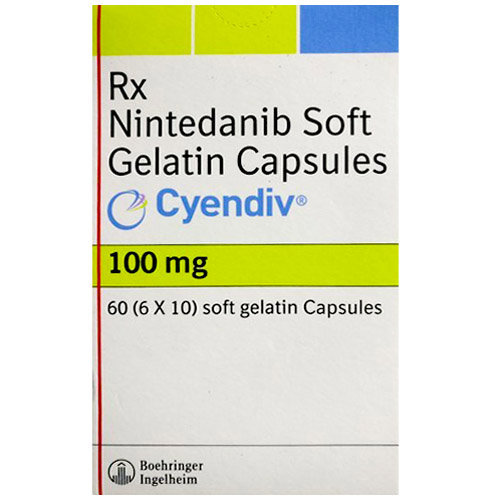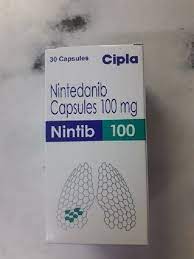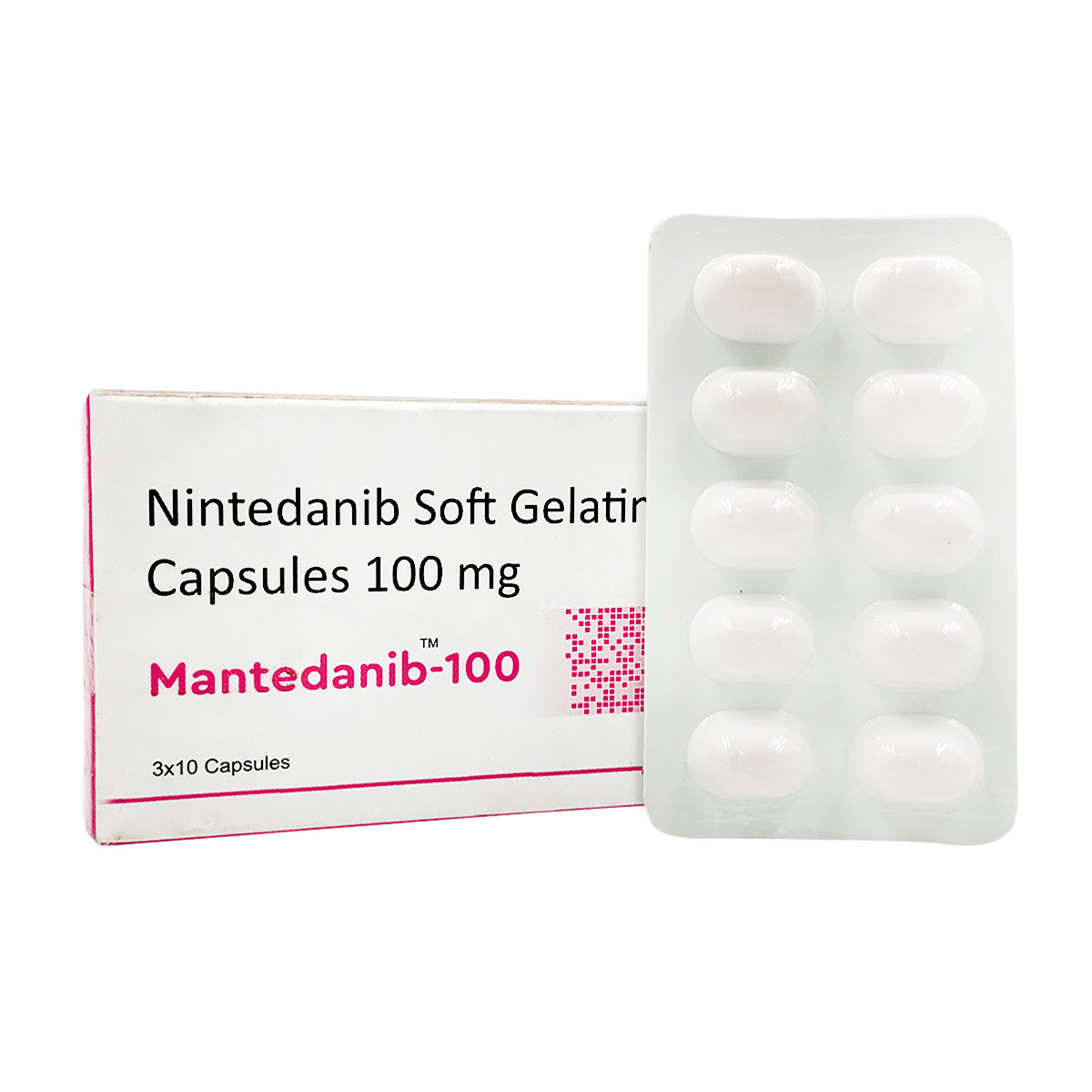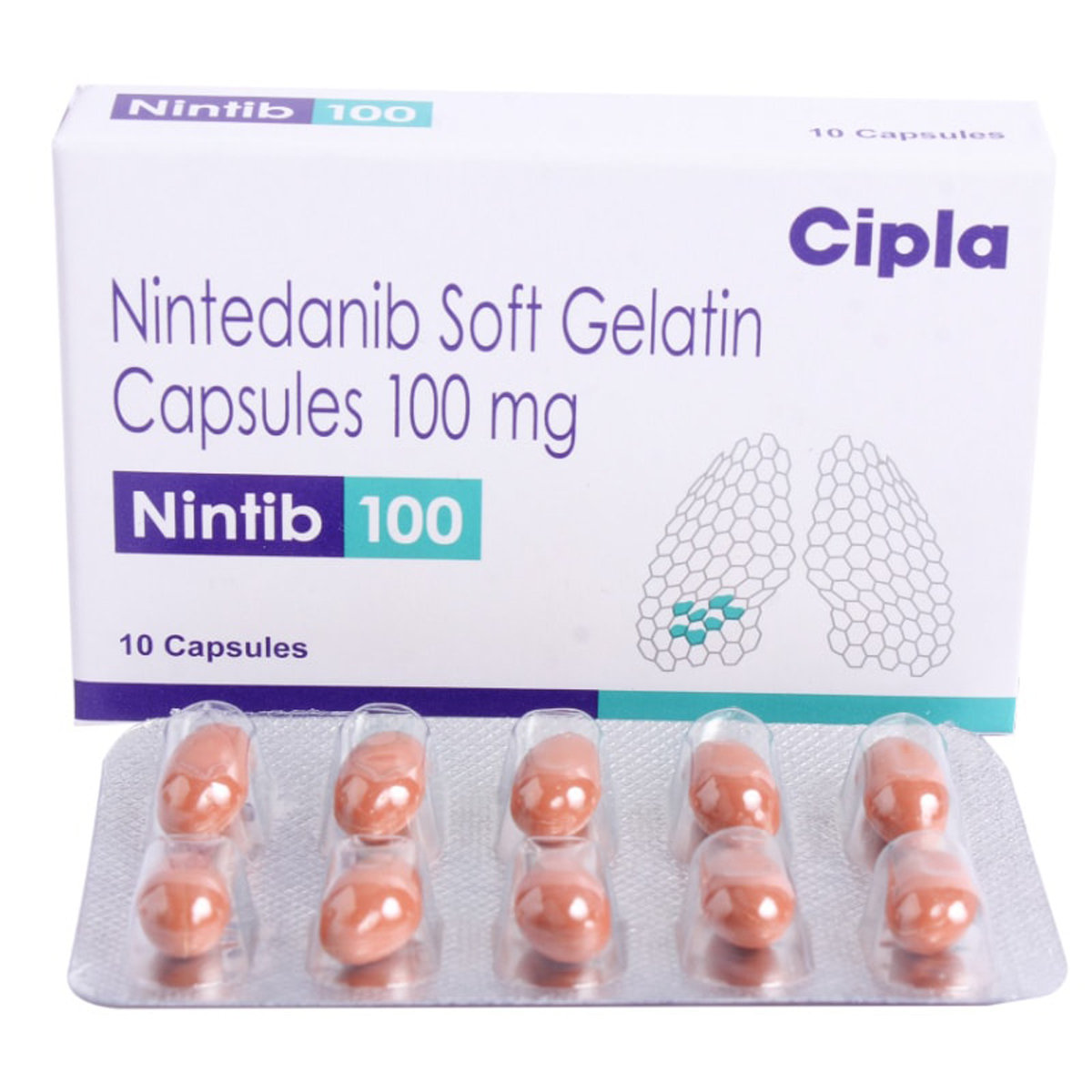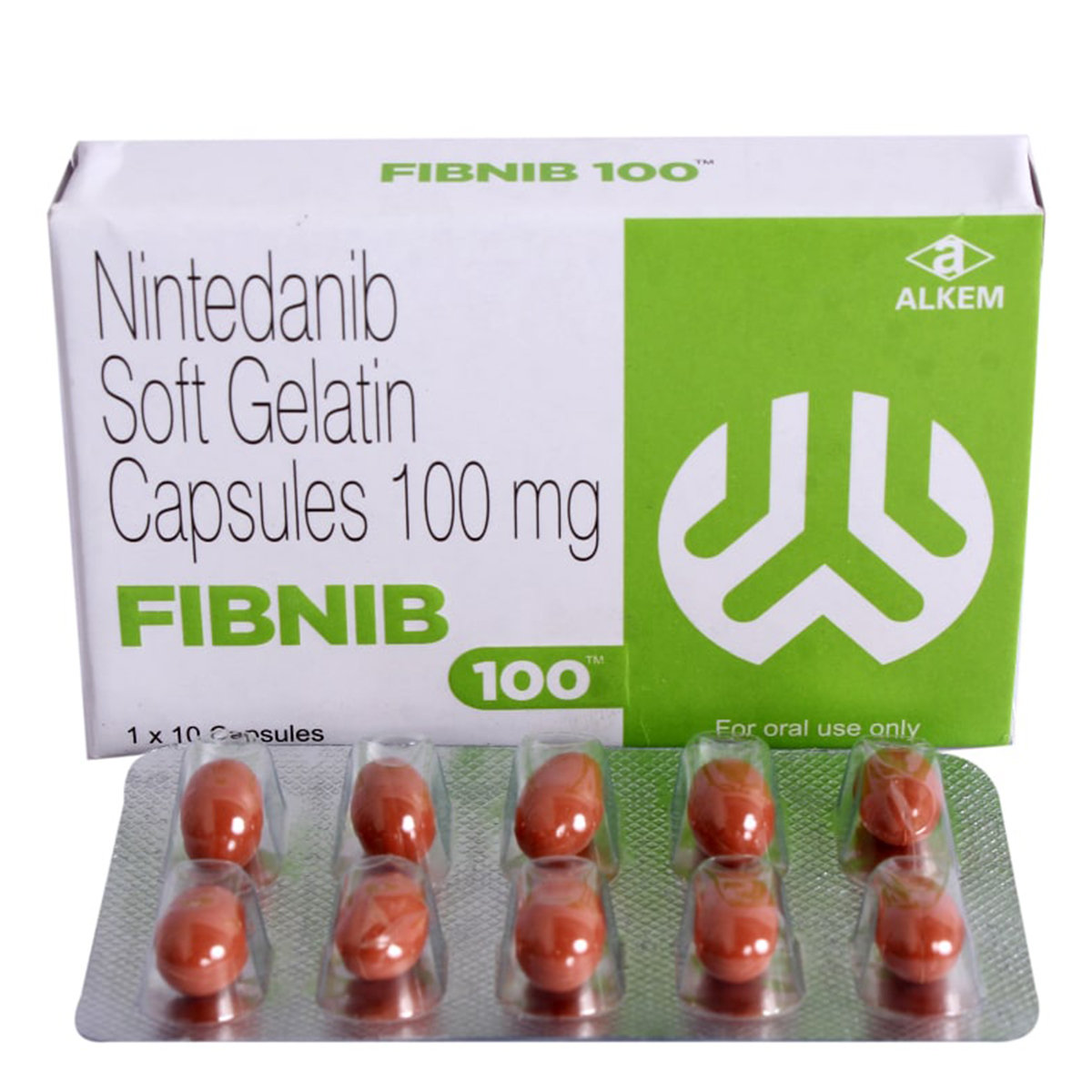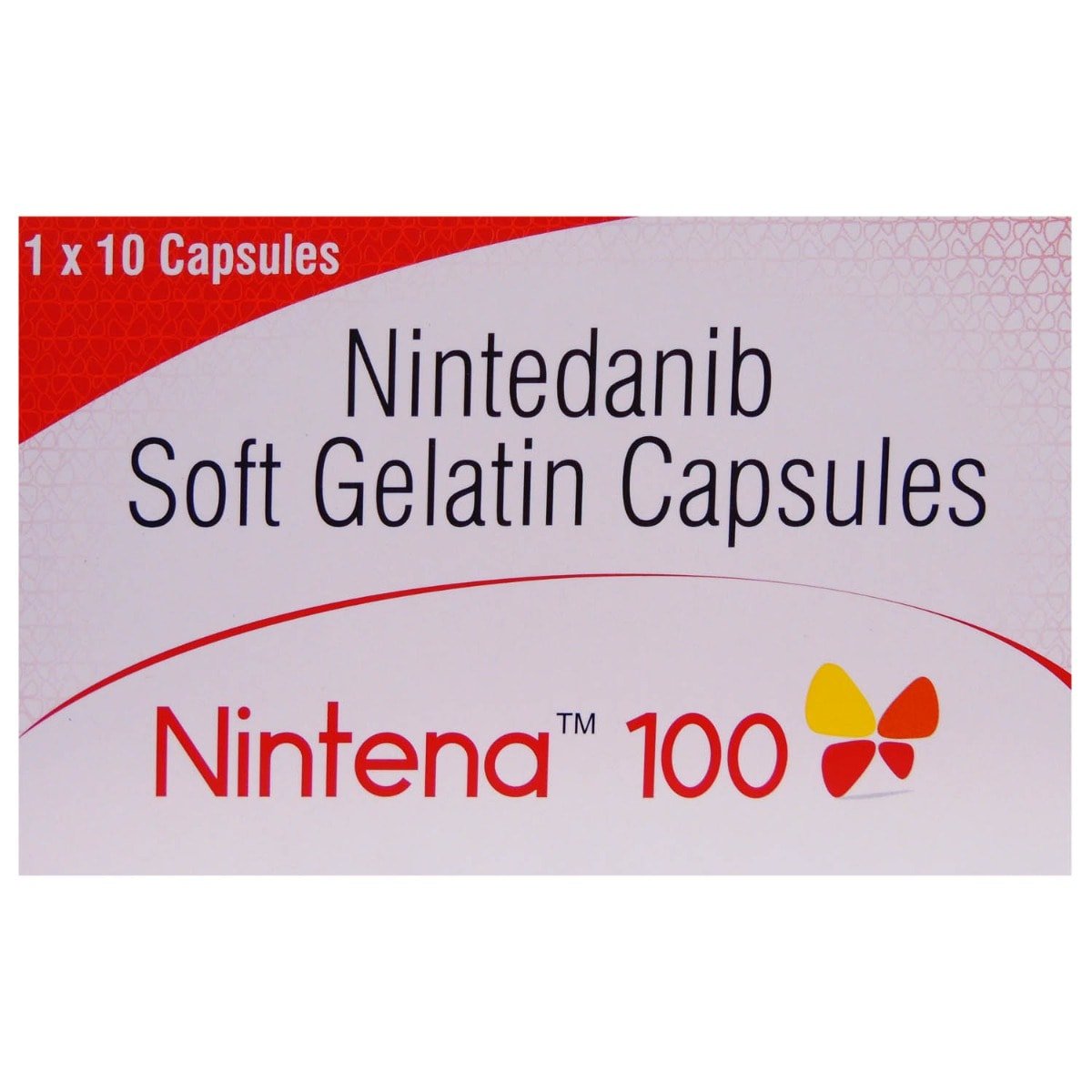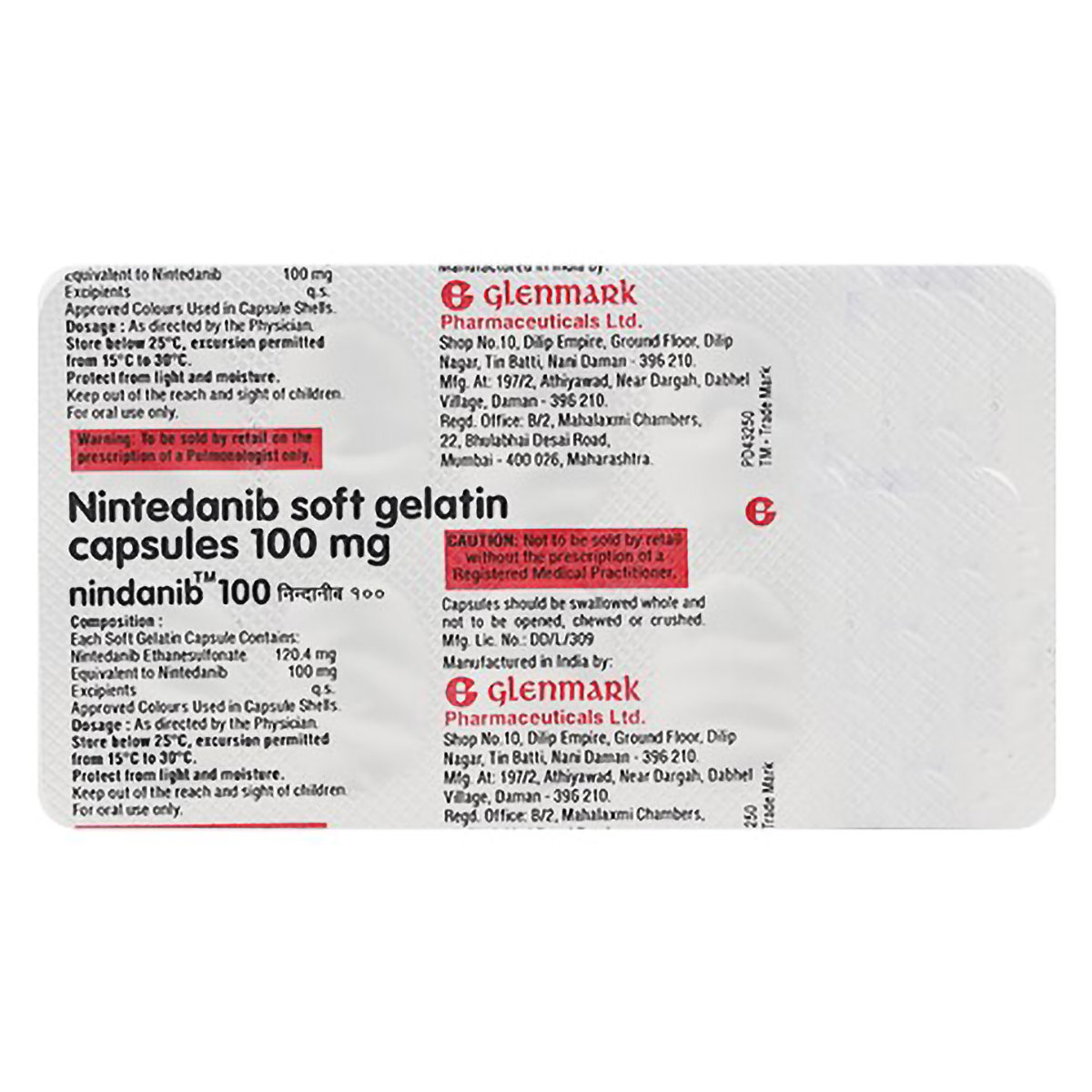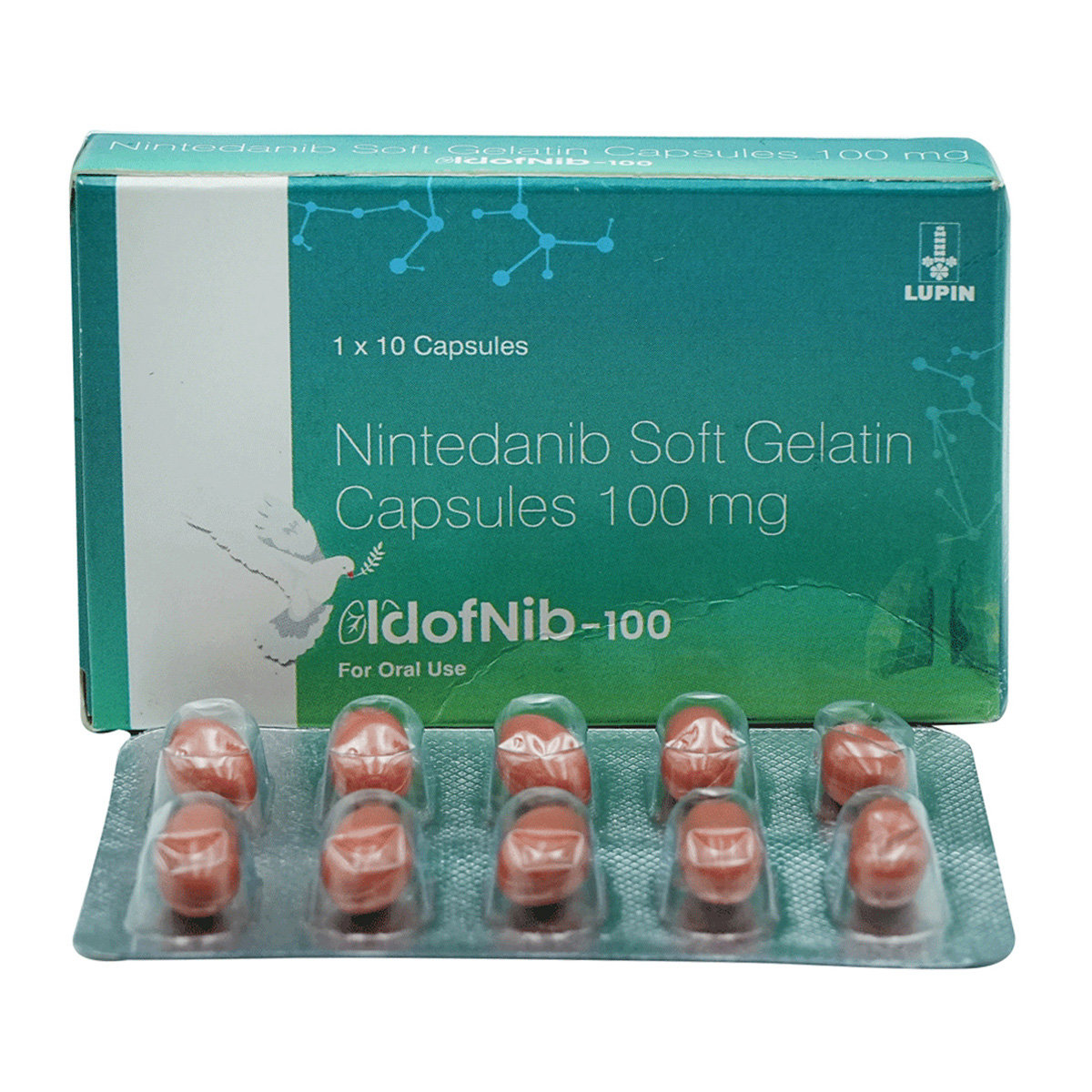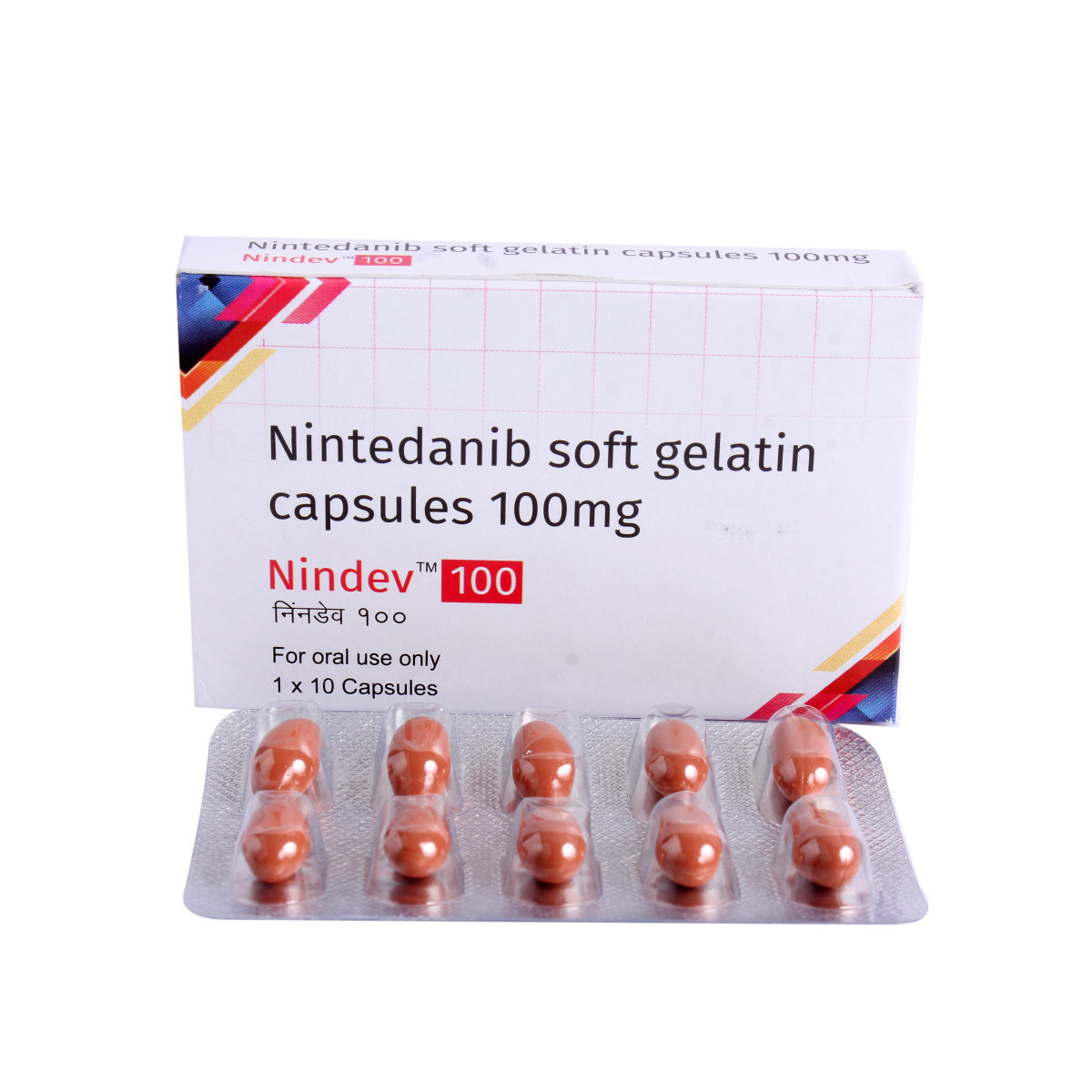Cyendiv 100Mg 60 Capsule
MRP ₹12992.5
(Inclusive of all Taxes)
₹1948.9 Cashback (15%)
Provide Delivery Location
Online payment accepted
 Prescription drug
Prescription drugWhats That
Composition :
Manufacturer/Marketer :
Consume Type :
Expires on or after :
Return Policy :
About Cyendiv 100Mg 60 Capsule
Cyendiv 100Mg 60 Capsule belongs to the category of 'anti-fibrotic medicine', and it is primarily used to treat idiopathic pulmonary fibrosis (IPF) in adults. IPF is an irreversible disease marked by a progressive decline in lung function. The tissues in the lungs become swollen and scarred over time, due to which it gets difficult to breathe deeply. The scarring makes it hard for the lungs to work properly.
Cyendiv 100Mg 60 Capsule contains 'Nintedanib', which helps reduce the scarring and swelling in the lungs by decreasing the release/activity of naturally occurring growth factors in the body, allowing you to breathe better. Cyendiv 100Mg 60 Capsule helps in slowing down the progress of idiopathic pulmonary fibrosis.
Always use this medicine as your doctor has told you or per the package leaflet. You must keep to your doctor's instructions to get the maximum benefit. In some cases, you may experience common side effects such as nausea, tiredness, diarrhoea, indigestion, loss of appetite, headache, and photosensitivity. Most of these side effects do not require medical attention and will resolve gradually over time. However, you are advised to talk to your doctor if you experience these side effects persistently.
Consult your doctor before taking Cyendiv 100Mg 60 Capsule if you are pregnant or breastfeeding. Cyendiv 100Mg 60 Capsule may cause tiredness and dizziness, so drive with caution. Avoid consuming alcohol with Cyendiv 100Mg 60 Capsule as it could lead to increased dizziness. Cyendiv 100Mg 60 Capsule is not recommended for children below 18 years as safety and effectiveness have not been established. Cyendiv 100Mg 60 Capsule is listed as pregnancy category D. Because Cyendiv 100Mg 60 Capsule can cause harm to the fetus, women of childbearing potential should be advised to avoid becoming pregnant while receiving treatment with Cyendiv 100Mg 60 Capsule. Consult your doctor if you are breastfeeding; your doctor will decide whether the Cyendiv 100Mg 60 Capsule can be taken by breastfeeding mothers or not. Keep your doctor informed about your health condition and medicines to rule out any side effects.
Uses of Cyendiv 100Mg 60 Capsule
Directions for Use
Key Benefits
Cyendiv 100Mg 60 Capsule is an anti-fibrotic medicine used to treat idiopathic pulmonary fibrosis (IPF) in adults. Cyendiv 100Mg 60 Capsule can help effectively slow the rate of lung function decline by 50%. Cyendiv 100Mg 60 Capsule helps reduce the scarring and swelling in the lungs by decreasing the release/activity of naturally occurring growth factors in the body, allowing you to breathe better. Cyendiv 100Mg 60 Capsule helps in slowing down the progress of idiopathic pulmonary fibrosis.
Storage
- Inform Your Doctor: Notify your doctor immediately about your diarrhoea symptoms. This allows them to adjust your medication or provide guidance on managing side effects.
- Stay Hydrated: Drink plenty of fluids to replace lost water and electrolytes. Choose water, clear broth, and electrolyte-rich drinks. Avoid carbonated or caffeinated beverages to effectively rehydrate your body.
- Follow a Bland Diet: Eat easy-to-digest foods to help firm up your stool and settle your stomach. Try incorporating bananas, rice, applesauce, toast, plain crackers, and boiled vegetables into your diet.
- Avoid Trigger Foods: Steer clear of foods that can worsen diarrhoea, such as spicy, fatty, or greasy foods, high-fibre foods, and dairy products (especially if you're lactose intolerant).
- Practice Good Hygiene: Maintain good hygiene to prevent the spread of infection. To stay healthy, wash your hands frequently, clean and disinfect surfaces regularly, and avoid exchanging personal belongings with others.
- Take Anti-Diarrheal Medications: If your doctor advises, anti-diarrheal medications such as loperamide might help manage diarrhoea symptoms. Always follow your doctor's directions.
- Keep track of your diarrhoea symptoms. If they don't get better or worse or are accompanied by severe stomach pain, blood, or dehydration signs (like extreme thirst or dark urine), seek medical help.
- Inform your doctor about the nausea and discuss possible alternatives to the medication or adjustments to the dosage.
- Divide your daily food intake into smaller, more frequent meals to reduce nausea.
- Opt for bland, easily digestible foods like crackers, toast, plain rice, bananas, and applesauce.
- Avoid certain foods that can trigger nausea, such as fatty, greasy, spicy, and smelly foods.
- Drink plenty of fluids, such as water, clear broth, or electrolyte-rich beverages like coconut water or sports drinks.
- Use ginger (tea, ale, or candies) to help relieve nausea.
- Get adequate rest and also avoid strenuous activities that can worsen nausea.
- Talk to your doctor about taking anti-nausea medication if your nausea is severe.
- Record when your nausea occurs, what triggers it, and what provides relief to help you identify patterns and manage your symptoms more effectively.
- Preventing Vomiting (Before it Happens)
- Take medication exactly as prescribed by your doctor. This can help minimize side effects, including vomiting.
- Having a small meal before taking your medication can help reduce nausea and vomiting.
- Talk to your doctor about taking anti-nausea medication along with your prescribed medication.
- Managing Vomiting (If it Happens)
- Try taking ginger in the form of tea, ale, or candy to help alleviate nausea and vomiting.
- What to Do if Vomiting Persists
- Consult your doctor if vomiting continues or worsens, consult the doctor for guidance on adjusting your medication or additional treatment.
- Drink water or other clear fluids.
- To prevent worsening of pain, limit intake of tea, coffee, or alcohol.
- Include bland foods like rice, toast, crackers, and rice in your diet.
- Avoid lying down immediately after eating as it may cause indigestion or heartburn.
- Avoid acidic and spicy food as it may cause indigestion.
- Avoid other medicines that increase the risk of bleeding.
- Use an electric razor and a soft-bristled toothbrush.
- Monitor for signs of bleeding like bleeding gums, unusual bruising, blood in stool, nosebleeds, or heavy menstrual bleeding.
- If you experience severe bleeding, apply direct pressure on the wound and consult a doctor promptly.
- If the risk of bleeding is high, discuss with your doctor about possibility of switching to different medicine with a lower bleeding risk.
Drug Warnings
Do not use Cyendiv 100Mg 60 Capsule if you are allergic to any components present in Cyendiv 100Mg 60 Capsule. Cyendiv 100Mg 60 Capsule is listed as pregnancy category D; because Cyendiv 100Mg 60 Capsule can cause harm to the fetus, women of childbearing potential should be advised to avoid becoming pregnant while receiving treatment with Cyendiv 100Mg 60 Capsule. Consult your doctor if you are breastfeeding; your doctor will decide whether the Cyendiv 100Mg 60 Capsule can be taken by breastfeeding mothers or not. Keep your doctor informed about your health condition and medicines to rule out any side effects. Cyendiv 100Mg 60 Capsule may cause tiredness and dizziness, so drive with caution. Avoid consuming alcohol with Cyendiv 100Mg 60 Capsule as it could lead to increased dizziness. Cyendiv 100Mg 60 Capsule is not recommended for children below 18 years as safety and effectiveness have not been established.
Drug-Drug Interactions
Drug-Drug Interactions
Login/Sign Up
Coadministration of Cyendiv 100Mg 60 Capsule with Fosphenytoin can reduce the levels of Cyendiv 100Mg 60 Capsule. This can lead to low treatment outcomes.
How to manage the interaction:
Although there is a possible interaction between Cyendiv 100Mg 60 Capsule and Fosphenytoin, you can take these medicines together if prescribed by your doctor. Do not stop using any medications without a doctor's advice.
Co-administration of Leflunomide and Cyendiv 100Mg 60 Capsule can increase the risk of liver problems.
How to manage the interaction:
Co-administration of Leflunomide and Cyendiv 100Mg 60 Capsule can lead to an interaction, they can be taken together if prescribed by a doctor. However, if you experience fever, chills, joint pain or swelling, unusual bleeding or bruising, skin rash, itching, less desire to eat, fatigue, nausea, vomiting, abdominal pain, or yellowing of the skin or eyes, contact a doctor immediately. Do not discontinue any medications without consulting a doctor.
Coadministration of Phenytoin and Cyendiv 100Mg 60 Capsule may decrease the blood levels of Cyendiv 100Mg 60 Capsule, which may reduce Cyendiv 100Mg 60 Capsule's effectiveness.
How to manage the interaction:
Although taking Phenytoin and Cyendiv 100Mg 60 Capsule together can result in an interaction, it can be taken when your doctor has prescribed it. Contact a doctor if your symptoms do not improve. Do not stop taking any drugs without consulting a doctor.
Co-administration of Lomitapide and Cyendiv 100Mg 60 Capsule can increase the risk of liver problems.
How to manage the interaction:
Co-administration of Lomitapide and Cyendiv 100Mg 60 Capsule can lead to an interaction, but it can be taken if your doctor advises. However, if you experience any symptoms like fever, chills, joint pain, unusual bleeding, skin rash, vomiting, abdominal pain, dark-colored urine, light-colored stools, and/or yellowing of the skin or eyes, contact your doctor immediately. Do not discontinue any medications without first consulting your doctor.
Coadministration of Cyendiv 100Mg 60 Capsule and primidone can reduce the blood levels of Cyendiv 100Mg 60 Capsule.
How to manage the interaction:
Although there is an interaction between Cyendiv 100Mg 60 Capsule and primidone, it can be taken if prescribed by a doctor. However, if you experience any unusual symptoms, contact a doctor immediately. Do not discontinue any medications without consulting a doctor.
Coadministration of Cyendiv 100Mg 60 Capsule and Rifapentine can reduce the blood levels of Cyendiv 100Mg 60 Capsule.
How to manage the interaction:
There may be a possibility of interaction between Cyendiv 100Mg 60 Capsule and Rifapentine, but it can be taken if prescribed by a doctor. Contact your doctor if your symptoms do not improve. Do not discontinue any medications without consulting your doctor.
Coadministration of Dexamethasone may lower the blood levels of Cyendiv 100Mg 60 Capsule, making the medication less effective in treating your condition.
How to manage the interaction:
Although there is a possible interaction, Dexamethasone can be taken with Cyendiv 100Mg 60 Capsule if prescribed by the doctor. Contact a doctor if your symptoms do not improve. Do not discontinue any medications without consulting a doctor.
Coadministration of Cyendiv 100Mg 60 Capsule and Tipranavir can reduce the blood levels of Cyendiv 100Mg 60 Capsule.
How to manage the interaction:
There may be a possibility of interaction between Cyendiv 100Mg 60 Capsule and Tipranavir, but it can be taken if prescribed by a doctor. Contact your doctor if your symptoms do not improve. Do not discontinue any medications without first consulting your doctor.
Coadministration of Cyendiv 100Mg 60 Capsule with Rifampicin can decrease the blood levels of Cyendiv 100Mg 60 Capsule, which may make the medication less effective.
How to manage the interaction:
Although there is an interaction between Cyendiv 100Mg 60 Capsule and rifampicin, they can be taken together if prescribed by a doctor. Do not discontinue any medications without consulting a doctor.
Taking Phenobarbital and Cyendiv 100Mg 60 Capsule can drastically lower Cyendiv 100Mg 60 Capsule levels in the blood, making the medicine less effective in treating the illness.
How to manage the interaction:
Although taking phenobarbital with Cyendiv 100Mg 60 Capsule can lead to interaction, they can be taken if recommended by a doctor. Contact a doctor if your symptoms do not improve. Do not stop using any medications without talking to a doctor.
Drug-Food Interactions
Drug-Food Interactions
Login/Sign Up
Diet & Lifestyle Advise
- Watch out for triggers that worsen the cough, such as smoke, foods, air-conditioning, high altitude, etc.
- Exercise moderately. Eat healthily.
- Follow pulmonary rehabilitation program. It includes exercise, disease education, and group therapy.
- Quit smoking and alcohol.
- Get ample rest.
- Include green leafy vegetables, sweet potatoes, broccoli, tomatoes, carrots, mangoes, citrus fruits, berries, and cocoa.
- Lean proteins such as fish, meat, and poultry are the best.
- Hydration is important. Drink plenty of water, herbal tea, and vegetable and fruit juices.
- Avoid processed and refined foods.
Side Effects of Cyendiv 100Mg 60 Capsule
- Diarrhoea
- Feeling and being sick
- Tummy (Abdominal) Pain
- Loss of appetite and weight loss
Habit Forming
Therapeutic Class
All Substitutes & Brand Comparisons
RX
Nintib 100 Capsule 30's
Cipla Ltd
₹78
(₹2.34 per unit)
98% CHEAPERRX
Prutis 100 Softgel Capsule 10's
Hetero Drugs Ltd
₹609
(₹54.81 per unit)
69% CHEAPERRX
Out of StockMacdanib 100 Softgel Capsule 10'S
Macleods Pharmaceuticals Ltd
₹690
(₹62.1 per unit)
65% CHEAPER
Author Details
We provide you with authentic, trustworthy and relevant information
Drug-Diseases Interactions
Drug-Diseases Interactions
Login/Sign Up
FAQs
Drug-Drug Interactions Checker List
- KETOCONAZOLE
- ERYTHROMYCIN
- CYCLOSPORINE
- RIFAMPICIN
- CARBAMAZEPINE
- PHENYTOIN
Special Advise
- Regular blood tests and occasional tests of your bone marrow will be carried out to check whether the treatment is working. If it does work, it will usually be taken for life.
Disease/Condition Glossary
Idiopathic pulmonary fibrosis (IPF): Idiopathic pulmonary fibrosis belongs to a group of interstitial lung diseases. It is an irreversible chronic disease marked by a progressive decline in lung function. The tissues in the lungs become inflamed and scarred over time, due to which it gets difficult to breathe properly. The scar tissue, known as fibrosis, becomes thick /stiff over time, making it hard for the lungs to work efficiently. This causes decreased lung function, which leads to increased breathlessness and coughing. Breathing difficulties can lead to other medical problems. Symptoms of IPF are shortness of breath, persistent dry cough, loss of appetite, weight loss, and rounded and widened tips of the fingers and toes.

Have a query?
Alcohol
Safe if prescribed
It is not known if alcohol interacts with Cyendiv 100Mg 60 Capsule. However, as a precautionary measure, you are recommended not to consume alcohol with the Cyendiv 100Mg 60 Capsule to avoid unpleasant side effects.
Pregnancy
Consult your doctor
Cyendiv 100Mg 60 Capsule is listed as pregnancy category D. Because Cyendiv 100Mg 60 Capsule can cause harm to the fetus, women of childbearing potential should be advised to avoid becoming pregnant while receiving treatment with Cyendiv 100Mg 60 Capsule.
Breast Feeding
Consult your doctor
Consult your doctor if you are breastfeeding; your doctor will decide whether Cyendiv 100Mg 60 Capsule can be taken by breastfeeding mothers or not.
Driving
Safe if prescribed
Cyendiv 100Mg 60 Capsule may significantly influence your ability to drive and use machines. You should not drive or operate machinery if you feel sick.
Liver
Consult your doctor
Dose adjustment may be needed. Cyendiv 100Mg 60 Capsule is not recommended for patients with severe hepatic impairment. Please consult your doctor if you have a liver impairment or any concerns.
Kidney
Consult your doctor
Dose adjustment may be needed. Cyendiv 100Mg 60 Capsule is not recommended for patients with an end-stage renal disease requiring dialysis. Please consult your doctor if you have kidney impairment or any concerns.
Children
Safe if prescribed
Cyendiv 100Mg 60 Capsule is not recommended for children below 18 years as safety and effectiveness have not been established.

